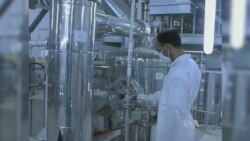The nuclear deal struck between Iran and six world powers in July ended decades of negotiations and setbacks, and has been hailed by U.S. President Barack Obama as one of the major achievements of the year.
The deal stipulates U.S. and European sanctions against Iran will be lifted in return for a reduction of Tehran's nuclear facilities, to prevent it from developing atomic weapons.
In his latest assessment this month, Yukiya Amano, the head of the U.N nuclear watchdog agency the IAEA, said Iran is on track.
"If your question is that Iran is planning to complete their preparatory activities in two, three weeks' time, I do not have a reason to doubt it," Amano said.
That could lead to Western sanctions being lifted in early 2016. Obama cites the nuclear deal as one of his ten reasons to be optimistic heading into the new year.
"We succeeded in forging a strong deal to stop Iran from obtaining a nuclear weapon,” he said. “In fact, Iran has already dismantled thousands of centrifuges that enrich uranium."
Iran’s new role
The agreement has transformed Iran's position on the world stage, says Mehrdad Khonsari of the Iranian Organization for Economic Reconstruction and National Reconciliation.
"It has ended Iran's isolation,” Khonsari said. “It has created a forum whereby Iran can reintegrate itself into the international community."
That reintegration is shifting the regional power balance between Shia-led Iran and Sunni-led Saudi Arabia, who are backing different sides in civil conflicts in Syria and Yemen.
With the West now engaged in fighting Sunni extremists like the Islamic State, Iran is seen as less of a security threat, Khonsari says.
"I think that recognition has come in the aftermath of this nuclear agreement,” he said, “coupled with the fact that when you look at the economy, and economic issues, you see that Iran is today, also, because of its population and resources, it is the world's, you might say, foreign investment market."
The most valuable of those resources — oil — is now up for grabs. The country announced this month that it is seeking $25 billion in investments from foreign companies in a large number of new contracts.
If sanctions are lifted early next year, the oil — and the money — will start flowing.






